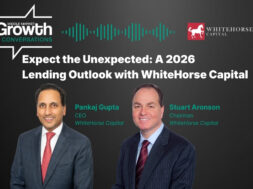Dealmaker Q&A: Baden Capital on Growing an Ag Acquisition
Baden’s Josh Guggenheim shares the firm’s winning formula for agricultural acquisitions

When private investment firm Baden Capital acquired OrCal, a provider of crop protection solutions, in January, the sponsor saw a sunny opportunity for year-round growth and geographic expansion. Josh Guggenheim, partner with Baden and an ACG San Francisco member, tells Middle Market Growth about the firm’s attraction to the agricultural sector, the major challenges and opportunities in the space and the growth strategies already underway at OrCal.
Middle Market Growth: What initially attracted Baden to the agricultural sector more broadly?
Josh Guggenheim: At Baden, we’re doing majority buyout transactions of specialty manufacturing and business services focused on the western U.S., and within that sphere, agriculture is an interesting subsector for us. We aren’t buying production agriculture assets like farms—we’re buying critical suppliers to farmers, which could be inputs or services or specialty machinery that farmers use to produce their product.
The reason we do that is first, we have experience in that sector. My business partner Brandon Rebiero and I actually met at a previous firm called Gold Leaf Farming where he was a co-founder and an operator, and I did real estate acquisitions and oversaw the acquisition of $300 million of farmland. Then we realized that agriculture service providers have pretty attractive business model characteristics. Generally, agricultural customers are hard to get, but they’re very loyal once you get them, and you end up with these stable and recurring revenue streams with mission-critical products that farmers don’t want to change. So, there are really attractive, stable businesses out there that we think we can enhance using our sector expertise, whether it’s by adding more products, adding more sales or just improving the margin profile.
MMG: Can you share more about the major opportunities that you’re seeing in the ag space as an investor?
JG: Sure. We like to be the first institution or first capital in a business, so we’re targeting smaller, $2-10 million EBITDA, family-owned businesses. And it turns out there’s a lot of those in the ag sector in more rural areas of the country—markets that are not exactly in high focus for Wall Street private equity. You’ve got this interesting generational trend where entrepreneurs in the ag sector are willing to sell their small businesses. They often don’t have a generational plan, so it’s a pretty target-rich environment, and there’s a lot of opportunities to buy really stable, good products with good, defensible intellectual property and then expand the company by introducing new products, going into new geographies and taking what the founder has built over the past decades or generations and continuing that legacy by doing the same thing, but intensifying it.
You’ve got this interesting generational trend where entrepreneurs in the ag sector are willing to sell their small businesses. They often don’t have a generational plan, so it’s a pretty target-rich environment.
Josh Guggenheim
Baden
MMG: And on the other hand, what are some of the biggest challenges in the sector?
JG: As I said, these businesses that we invest in are relatively stable, but of course, the end customer, the farmer, has a different business model in terms of commodity price changes, input price changes, tariffs, etc. When we’re looking at a business, we want to make sure that the end customer is relatively stable and profitable, or diversified enough when even if there’s a regional focus, we’re not putting all eggs in one basket, if you will. That’s obviously one challenge—the underlying cyclicity with the end grower and the end customer in managing those concerns. That’s probably number one, and then number two these days is tariffs, of course, though that’s not a challenge that’s necessarily specific to the agriculture sector. It’s a challenge that all businesses are thinking about in America today.
MMG: Now let’s zoom in a bit and talk more specifically about the OrCal acquisition Baden announced this January. Can you tell me what attracted Baden to OrCal as a target?
JG: OrCal is proudly based in Eugene, Oregon, in the Willamette Valley, and the company had two main partners—one focused on sales and one focused on technical development and engineering. Both wanted to retire and wanted a partner who could step in and not only buy the company but add value operationally on day one. We were a good partner for that.
The company historically does about 60% of their revenue in Oregon and Washington, maybe 30% in California and 10% in the rest of the country and has a suite of products that they sell throughout the year. There are some products used in Q1, some summer-related products that are used for heat, stress and water efficiency and some other products that are used in the fall. We also liked that many OrCal products are organic and help farmers protect against a volatile climate. So long story short, we really liked that this company had a well-balanced portfolio of products which each dominate their specific niches.
MMG: You closed that deal almost six months ago—what moves have you made since the deal closed? Any growth strategies you’re already implementing?
JG: As I mentioned, one of our main thematic focuses is taking the existing products and moving them into new markets where we think they’ll work, so we’ve invested a lot into the sales steam. Historically, the company has really focused solely on southern California, so we built a northern California sales team that will be focused on the Sacramento Valley. We’ve hired a new VP of chemistry who’s refreshing and launching a lot of interesting initiatives in regard to new product development and existing product formulation improvement. We’ve also hired a corporate development manager who’s looking at a few different opportunities for add-ons, which could be new companies or divestitures from bigger companies. He’s also looking at tolling opportunities, which is contract manufacturing for other companies—a kind of cool thing that OrCal offers. We have a very large facility at OrCal and a lot of excess capacity, so we toll for other folks’ products and there’s a lot of opportunity for growth which is very exciting.
We’re investing pretty substantially in our plant in Oregon, putting in new automated packing lines that will help us automate things instead of relying on labor. Looking ahead a little further, I think we’ll potentially set up some new facilities in the southeast to expand geographically. We’d retain the Willamette Valley focus but set up a physical presence in the southwest—there are some interesting opportunities there.
This interview has been edited and condensed for clarity.
Hilary Collins is ACG’s Associate Editor.
Middle Market Growth is produced by the Association for Corporate Growth. To learn more about the organization and how to become a member, visit www.acg.org.


